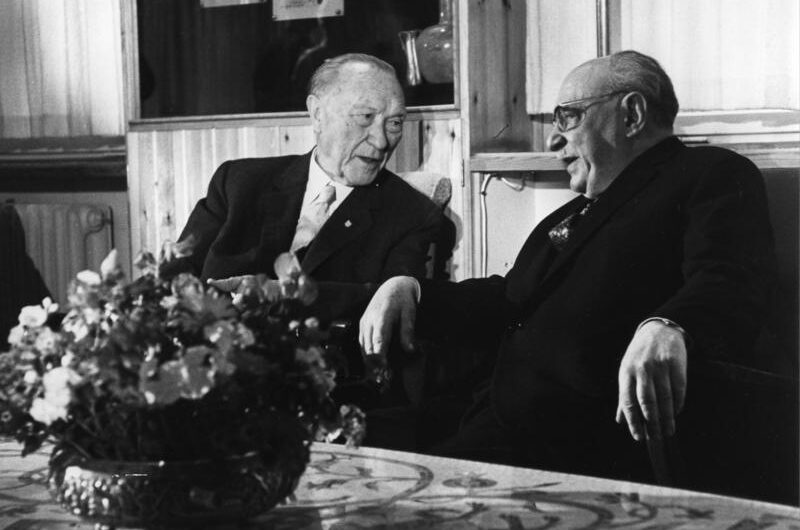
Deutsches Bundesarchiv via Wikimedia Commons
German-Israeli Relations on the 75th Anniversary of the State of Israel

Gisela Dachs
Hebrew University
Gisela Dachs is an international journalist and professor of communication at the European Forum and the Center for German Studies at the Hebrew University in Jerusalem. She has written several books about Israel and the Middle East and also edited the compendium “Country report Israel” published 2016 (in German) by the Federal Agency for Civic Education in Bonn.
Israeli-German relations have come a long way. On its 75th birthday on April 26, 2023, the State of Israel plans to host the chief pilot of the Luftwaffe in the airspace over Jerusalem and Tel Aviv. In a display of close cooperation, the Luftwaffe Eurofighter will make a flyby, with its wings painted in the flags of both countries.
Eight decades after the Holocaust, bilateral relations today are considered strong. In Israel, Berlin counts as the second most important ally after Washington. Frequent mutual visits are part of this special relationship that emerged over the years. Germany’s commitment to Israel’s security, famously named in 2008 as its “Staatsräson” by then-chancellor Angela Merkel, is one of its strongest pillars.
Most recently, on March 16, Prime Minister Benjamin Netanyahu and Chancellor Olaf Scholz stood side by side at Platform 17, a memorial at a Berlin train station from where thousands of Jews were deported to their deaths by the Nazis. Netanyahu was praising their trusted alliance, based not only on a common past but also on the “shared values” between the two countries today.
This common basis, however, is now being softly questioned in Germany—in light of the new Israeli coalition with radical far-right ministers and a plan for judicial overhaul that could clear the way for transforming Israel into an illiberal democracy. Scholz expressed his “concern” about how shared the much-lauded “shared values” really are. Before, President Frank-Walter Steinmeier and Foreign Minister Annalena Baerbock had already expressed their reservations as well. After a meeting with her Israeli counterpart Eli Cohen in the German capital, Baerbock seemed specifically concerned about an Israeli bill that would institute the death penalty for terrorists.
Discord, however, is not something entirely new. There have been disagreements in the past over settlements and visits of high-ranking German officials to Israeli anti-occupation NGOs, leading to suspended government consultations. There were also, at times, reports of Merkel’s confrontational phone calls with Netanyahu. However, compared to Washington, which is not willing to host Netanyahu “in the near future,” Germany seems to be solid ground.
Critics in both countries would like to see Berlin taking a much clearer stance vis-a-vis Israel, by insisting less on the rationale of the “Staatsräson” and more on the universalist lessons of the Holocaust that champion human and minority rights. But it seems that it is not so much the historical guilt standing in the way, rather than the fact that Berlin nowadays is busy with other things. Putin’s war in Ukraine has overshadowed much of its foreign agenda. So, it might have come as a relief for all three that—at least in the meantime—the judicial reform plans have been put on a hold. Netanyahu, faced with an unprecedented wave of protests and a rapidly declining popularity in the polls, has for now tried to calm things down.
The foundations of bilateral relations go beyond specific governments. Since diplomatic relations were established between Israel and West Germany in 1965, the ties between the two countries have continuously been deepened and strengthened, both at the official level and in the sphere of civil society.
Yet, while Germany is mainly looking East of Europe, the internal turmoil in Israel has also come to its capital, with Israelis demonstrating with Hebrew slogans in Berlin against Netanyahu’s visit—as it happened in Rome and London. This is new, and for the first time, even the Central Council of Jews in Germany shed its reluctance and loudly expressed concern over the growing social divisions in Israel. Its president, Josef Schuster, underlined that Jews all over the world “are proud that the Jewish State is the only democracy in the Middle East,” and that a “cutback of democratic structures would also not be acceptable for the Jewish community outside of Israel.”
Concern for Israel’s future path will most certainly also be surrounding the country’s 75th birthday. The date will be marked in Germany with festivities in many cities and parliaments. The foundations of bilateral relations go beyond specific governments. Since diplomatic relations were established between Israel and West Germany in 1965, the ties between the two countries have continuously been deepened and strengthened, both at the official level and in the sphere of civil society.
Chancellor Scholz made clear how important it was for him to come soon after taking office for a first visit to Jerusalem. He took off as planned at the beginning of March 2022, although Russia’s war against Ukraine had just managed to shake world politics. Only days before, in a move characterized as a Zeitenwende in Germany’s post-war history, Scholz had pledged to give—with 100 billion euros—an unprecedented booster to the German army. During their press conference in Jerusalem, Scholz stood next to then-Prime Minister Naftali Bennett, when the latter was asked by a German journalist how Israelis perceive the fact that Germany actually is rearming itself. In his answer, Bennett’s referred then to two pillars of German foreign policy: “Obviously it’s sensitive, but Germany represents today an anchor of stability and responsibility in the European Union, just as Israel is an anchor of stability and responsibility in the Middle East.”
If until then, some politicians from the SPD and the Greens had expressed reservations regarding military sales from or to Israel, the winds of a renewed cold war atmosphere made them inaudible. After years of debates, the defense committee of the parliament finally authorized in 2022 plans to arm the drones which the Bundeswehr leases from Israel. At the same time, the German foreign ministry under the Green politician, Baerbock, made sure to reject the apartheid accusations against Israel in the latest report of Amnesty International. It further argued that the “worrying rise of antisemitism in Europe brings to everybody who is committed to human rights the responsibility, not to help unintentionally the promotion (of antisemitism).”
In the meantime, the Israeli government has changed, but not Germany’s new military needs. During a visit to Washington at the beginning of March, Chancellor Scholz was reportedly given approval by Joe Biden to buy Israel’s Arrow 3 anti-ballistic missile system. The need for approval stems from U.S. involvement in funding the program. It is part of the defense strategy following the war between Russia and Ukraine and the need for protection from Russia’s ballistic missiles. The Arrow 3 will be deployed alongside its existing U.S. Patriot missiles defense, as a protection against ballistic missiles, including missiles with unconventional warheads.
The plan for missile protection is called Sky Shield, of which procurement of the Arrow 3 is only a part. So far, seventeen countries have joined this new collective defense concept. Germany, due to its good relations with Israel and the United States, will be responsible for operating a large part of the Arrow 3 system, including radar systems and interceptors. The final deal has yet to be announced; if it is officially formalized, it is estimated to give Israel a significant lever of influence over Europe, the Israeli newspaper Globes writes. The protection of all of Central Europe from the threat of Russian missiles, which is becoming more and more relevant as the countries deepen their involvement in the war in Ukraine, will be carried out through a “Made in Israel” defense system. 75 years after its foundation, the State of Israel, which in the past has received substantial military hardware from Germany, is now helping Berlin to build up a new security architecture for the future.








